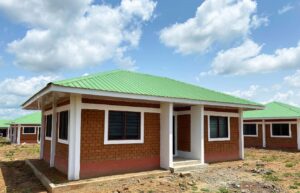By 2030, it is expected that Africa’s population will grow by 315 million. With buildings accounting for nearly 40% of energy-related global greenhouse gas emissions annually, constructing buildings in a sustainable manner is more important than ever before. With Ghana’s housing deficit over 2 million units, incorporating green building measures into affordable homes for the masses would be a key contributor to reducing the deficit specifically and global carbon footprint in general. Two developers in Ghana are leading the way with green affordable housing projects.

The Lahagu Housing Project
Real Estate Developers, the Afreh Group partnered with Reall, a UK-based development organization supporting affordable homes in Africa and Asia, to construct 100 eco-friendly, two-bedroom units in the Lahagu suburb of Tamale, the capital of Ghana’s Northern Region.
The project incorporated green building measures and duly received EDGE certification in April 2022. EDGE (“Excellence in Design for Greater Efficiencies”), is a free software, a green building standard, and an international green building certification system developed by the International Finance Corporation (IFC). EDGE receives significant funding from UK Government and Swiss State Secretariat for Economic Affairs (SECO) and helps to identify the most practical ways to build green in a fast, easy, and affordable way while considering the local baseline, which includes building codes, climatic data, and typical utility costs.
Through green measures such as low-flow water fittings, walls built with compressed earth blocks, and naturally ventilated spaces, the project is expected to achieve 34% improvements in energy efficiency, 31% improvements in water efficiency, and 56% improvements in embodied energy in materials, as compared with conventional local construction methods. The project siting in northern Ghana and as well as its beneficiaries made a significant mark in the real estate space in Ghana. The project which is the first EDGE-certified project in the region was delivered and handed over to members of the Tamale Community Cooperative Credit Union, a testament to what collaboration and partnerships can achieve to benefit of community and the environment.
The Knightsbridge Project

Another Ghanaian Real Estate Developer, Rehoboth has also made significant contribution to the reduction of the national housing deficit with construction of 1,700-unit apartment complex in the Kwabenya environs, Accra. The complex includes recreational facilities, sauna, commercial area and is fitted with green elements like efficient lighting, natural ventilation, low-flow faucets, and dual-flush toilets which will lead to reduction of electricity and water use by a third for residents.
Materials used in construction were those that require 50 percent less energy to manufacture, transport, and install compared to materials used in other buildings in Accra.
At the opening of the development in 2021, Gideon Akrofi, Rehoboth’s CEO said: “Rehoboth is proud to offer Ghanaians, for the first time, a triple-edged chance to save: save on purchase price, save on utilities, and save the earth, leading to a significantly lower total cost of ownership over a lifetime and beyond.”
The above examples are proof of concept that building green and affordable can be achieved with far reaching benefits once these innovative technologies are scaled up. The environment is preserved through reduction of buildings’ carbon foot print. Socially, access to accommodation will improve with increased housing stock, and economically, there will be creation of thousands of new jobs from new housing projects and schemes to meet the expected rise in population. Green affordable housing is a win-win.










